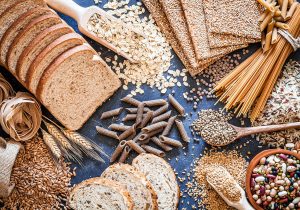
Comprehending carbohydrates
Over the years, carbohydrates have come under scrutiny and are often labeled as bad for you. In our diet-obsessed culture, carbohydrates, which are also known as “carbs,” are blamed for everything from weight gain and gut problems to diabetes and heart disease. As a result, too many people believe carbs are no good, but it’s time to cut the confusion about cutting carbs. Get a taste of the different kinds of carbohydrates, how carbohydrates function, and carbohydrates’ purpose in cells, along with healthy advice on enjoying the carbs you crave by understanding carbohydrates on food labels.
The complex issue of carbohydrates
Carbohydrates are misunderstood. Far too many people think they cause far too many problems with their bodies, their weight, and their health. But it’s important to note that carbohydrates are one of the three essential macronutrients in foods and drinks, along with protein and fat. Each has its own value and importance in your diet. While all carbohydrates have a place in your diet, not all carbs are created equal. Carbohydrates are referred to as either simple or complex, but there are three different kinds of carbohydrates:
- Sugars – As a simple carbohydrate, or its most basic form, some sugars occur naturally in fruits, veggies, and dairy products. Other sugars in your diet are added for sweetness to candies, cookies, desserts, processed foods, juices, and sugary sodas.
- Starches – Considered a complex carbohydrate, you’ll find starches in grains, breads, pasta, rice, cereal, potatoes, legumes, beans, and corn.
- Fiber – This is another complex carb found in veggies, fruits, whole grains, nuts, beans, and seeds.
A slice of understanding carbohydrates, diabetes, and hyperglycemia
Carbohydrates function as a source of energy for your body and your brain. Carbohydrates get broken down into glucose, or blood sugar, which gets absorbed into your bloodstream and is used to fuel your body and brain. The amount of carbohydrates you consume influences your blood sugar levels. That’s why in understanding carbohydrates, diabetes must be discussed, along with the effects of carbohydrates and hyperglycemia, which is another name for high blood sugar levels. Simple carbohydrates like sugary snacks raise your blood sugar much faster than complex carbs found in grains and veggies. That’s because complex carbohydrates are absorbed much slower by your body and have less of an impact on your blood sugar. Simply put, eat too many simple carbohydrates and hyperglycemia can develop, which can raise your risk of type 2 diabetes. By understanding carbohydrates, diabetes can hopefully be avoided.
Good reasons to load up on carbs
With so many quick-fix diet fads claiming that carbs are the enemy, it can be hard to swallow the truth that carbs are your friend. You already know that carbohydrates function as fuel, but that’s just the beginning of all of the ways they help you from head to toe. Check out the top five reasons to keep carbs in your life and on your plate:
- Energy for the long haul – and long days – Carbohydrates function as fuel. Carbohydrates’ purpose in your cells is to power your body and brain throughout the day.
- Fills you up without filling you out – Fiber-filled carbs help you feel fuller faster, which helps control your appetite and your weight.
- Good mood food – Carbohydrates tell your brain to release a burst of feel-good serotonin, which is a chemical that boosts your mood.
- Shows your heart some love – The soluble fiber in complex carbs helps reduce your risk of heart disease by reducing the cholesterol your body absorbs.
- Boosts your brainpower – Carbs are broken down into glucose, which your brain needs to function, learn, and remember.
Healthy ways to incorporate carbs
Your body craves carbohydrates, but it’s important to feed it the right amounts of the right kinds of carbs. So, what’s the right amount for you? In general, aim to get 45% to 65% of your daily calories from carbohydrates, but you should speak to your SignatureMD-affiliated doctor to learn what’s right for you. However, just as all carbs aren’t created equal, all carbs aren’t equally good for your health. You want to focus on whole foods like fruits, veggies, and whole grains before reaching for packaged products. When your carbs must come from a box or bag, you want to make the right choices, which begins by understanding carbohydrates on food labels. Look at labels on the back of the package to find the total carbohydrates, which breaks down the amounts of fiber, total sugar, and added sugars in a serving. To make carbohydrates part of a healthy diet, consider this expert advice:
- When going for grains, choose grains that are whole rather than refined, such as oats, brown rice, whole-wheat bread and pasta, quinoa, and barley.
- Eat foods full of fiber.
- Enjoy a spectrum of colorful whole fruits and vegetables.
- Go nuts by noshing on walnuts, almonds, macadamia nuts, cashews, peanuts, etc.
- Load up on legumes like lentils, peas, and chickpeas.
- Bring on the beans, from black and navy to kidney beans.
- Limit foods full of added sugar. While a small amount of sugar isn’t bad, too much isn’t good for your health. By understanding carbohydrates on food labels, you’ll be able to clearly spot how much sugar is added to packaged foods. You may be surprised at how much added sugar is hidden in everyday foods like tomato sauce, cereal, salad dressing, and condiments.
Sources:
- https://medlineplus.gov/carbohydrates.html
- https://diabetes.org/healthy-living/recipes-nutrition/understanding-carbs
- https://www.healthline.com/nutrition/good-carbs-bad-carbs
About SignatureMD
SignatureMD is one of the nation’s largest firms providing initial conversion and ongoing support services to concierge medicine physicians. SignatureMD currently partners with over 200 affiliated primary care physicians and specialists across 35 states, and its network is rapidly expanding.